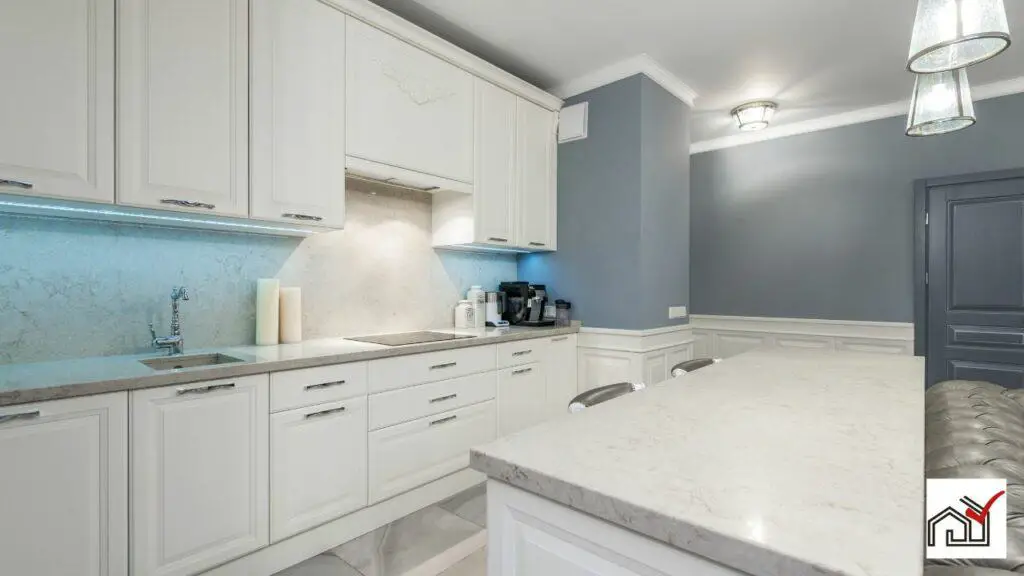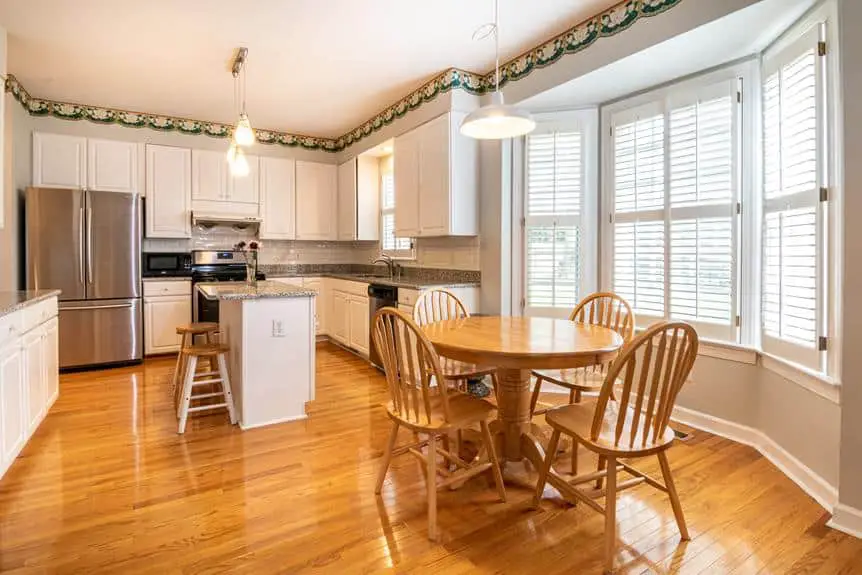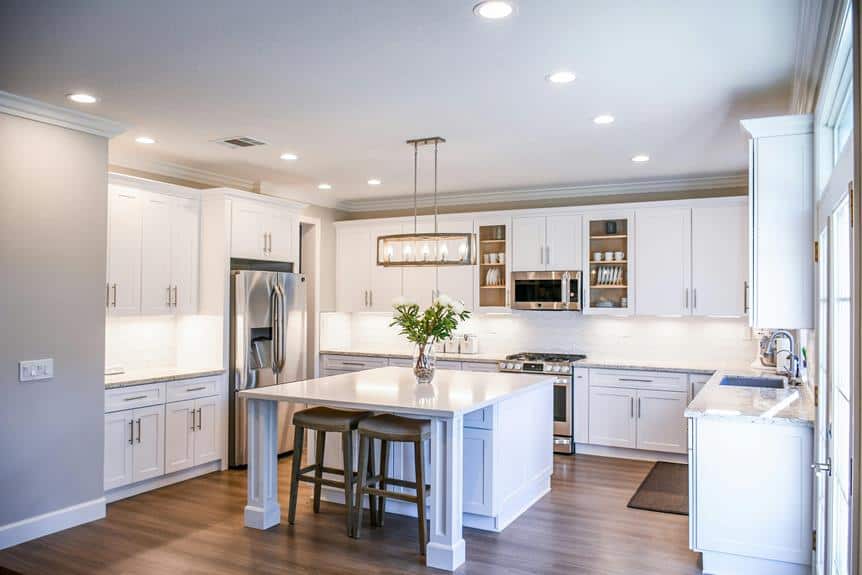Cost is an important consideration in kitchen remodels, especially for countertops. Granite is durable and attractive but can be costly. Sometimes, quartz may be cheaper than granite. More affordable alternatives include:
- Laminate: This material is inexpensive and comes in many designs.
- Ceramic tile: It offers a customizable, traditional appearance.
- Butcher block: It provides a natural wood look.
- Solid surface countertops: They have a smooth, modern appeal.
Other budget-friendly choices are:
- Recycled glass: This material is a cost-effective substitute for granite.
- Concrete: It offers a unique advantage in terms of design flexibility.
- Stainless steel: It provides a sleek and contemporary look.
Each of these materials has its own advantages and can be a more affordable option compared to granite.
Laminate: Affordable Versatility
Laminate countertops are an economical choice compared to granite, offering a range of designs. They consist of compressed layers of paper and resins, resulting in a durable surface. Laminate comes in various colors and textures, including those that resemble natural stone, wood, or quartz, providing a cost-effective way to achieve a luxurious appearance.
These countertops are low-maintenance, requiring only regular cleaning with a sponge and cleaner, with no need for sealant application. They can be installed quickly and at a lower cost than granite, which usually requires professional services.
Their ease of installation, combined with durability, makes laminate countertops a practical and budget-friendly option for upgrading kitchens and bathrooms.
Ceramic Tile: Classic Charm
Ceramic tile countertops are an affordable option for kitchen surfaces, with prices ranging from $5 to $30 per square foot. They are appreciated for their traditional appearance and their wide selection of colors and patterns that suit various design tastes. These countertops are easy to clean and maintain due to their glazed surfaces, which are resistant to stains and spills, making them practical for kitchens.
Tiles also offer flexibility in design, allowing for customization in home projects. The installation process is straightforward, which can appeal to those interested in do-it-yourself home improvements for a cost-effective kitchen update.
For a more sophisticated look, combining tile countertops with solid surface materials can provide a stylish yet less expensive alternative to granite. This mix enhances the kitchen's aesthetic while keeping costs down.
Ceramic tile countertops continue to be a favored choice for their balance of affordability and style.
Butcher Block: Warmth of Wood
Butcher block countertops provide an economical and visually appealing option compared to granite. Known for their natural look, these countertops create a welcoming environment in kitchens and bathrooms. Prices range from $10 to $38 per square foot, offering a budget-friendly choice without sacrificing style or function.
These countertops are made from different woods such as cherry, bamboo, walnut, and oak, each adding distinct color and character. The solid construction of butcher block is reminiscent of traditional styles and provides a durable work surface.
To maintain their appearance, wood countertops require sealing to protect against moisture. Simple upkeep, including regular oiling and sealing, helps to prevent the wood from drying or cracking. If damaged, butcher block can be sanded and refinished, giving it an advantage over some other countertop materials that can show wear more noticeably.
Solid Surface: Seamless Elegance
Solid surface countertops, such as those made from Corian®, provide an affordable alternative to granite with a seamless appearance. They are cost-effective, available in numerous colors and patterns, and can be tailored to fit any kitchen or bathroom. These countertops are engineered composites, offering a similar aesthetic to granite at a lower cost.
They are lightweight, making them easy to work with for both DIY projects and professional installations. Solid surfaces are durable and can be repaired if damaged, although they are not as hard as natural stone and may need regular maintenance to keep their appearance.
One of the main benefits of solid surface countertops is their non-porous nature, which prevents the growth of bacteria and mold, promoting hygiene. Cleaning is simple, usually requiring just a cloth and mild detergent.
Quartz: Engineered Beauty
Quartz countertops are a durable and attractive alternative to granite, offering a blend of practicality and style. They are made by combining around 95% ground quartz with 5% polymer resins, creating a strong, non-porous surface. This makes quartz countertops highly durable and eliminates the need for regular sealing, unlike granite.
These countertops are low maintenance and hygienic, making them suitable for both home and commercial kitchens. Their non-porous quality helps prevent stains and reduces the chances of bacteria and virus growth.
Quartz also provides a wide range of design options, from solid colors to patterns that resemble natural stone. This variety allows for customization to fit any design theme, making quartz a flexible choice for interior design. It balances aesthetics, functionality, and cost-effectiveness, making it a competitive option for kitchen surfaces.
Recycled Glass: Eco-Friendly Shine
Recycled glass countertops are a cost-effective and environmentally friendly alternative to granite. They are made from repurposed glass, offering a unique look with a variety of color choices to fit different design needs. These countertops are low-maintenance, as they don't need periodic sealing like granite does, and their non-porous surface makes them stain-resistant and easy to clean.
Choosing recycled glass helps reduce the environmental impact by using less natural resources and keeping glass out of landfills. The countertops also have a reflective quality that can brighten spaces.
Concrete: Customizable and Cool
Concrete countertops are an affordable and customizable alternative to traditional granite. They allow for a variety of color and texture options, giving homeowners the chance to personalize their spaces. Concrete is durable, resistant to kitchen hazards like heat, stains, and scratches, and can be shaped into any size with different textures or inlays.
Concrete is generally less expensive than granite, with costs varying based on finishes and custom features. It offers design flexibility with a wide range of pigments and surface treatments for different looks, from polished to textured finishes. Concrete countertops do require professional installation and regular sealing to protect against moisture and stains.
Stainless Steel: Industrial Chic
Stainless steel countertops offer a sleek, industrial look and are a cost-effective choice for those wanting a modern kitchen. They are lighter than granite, making installation easier and possibly cheaper.
Stainless steel is very hygienic, resisting bacteria, which is why it's commonly used in professional kitchens and now also in homes. These countertops are easy to clean and can handle strong cleaning agents.
They can extend to form a backsplash for a unified appearance and extra wall protection. Stainless steel's durability means it can handle daily use with minimal wear. Any scratches or dents can add to the industrial aesthetic.




